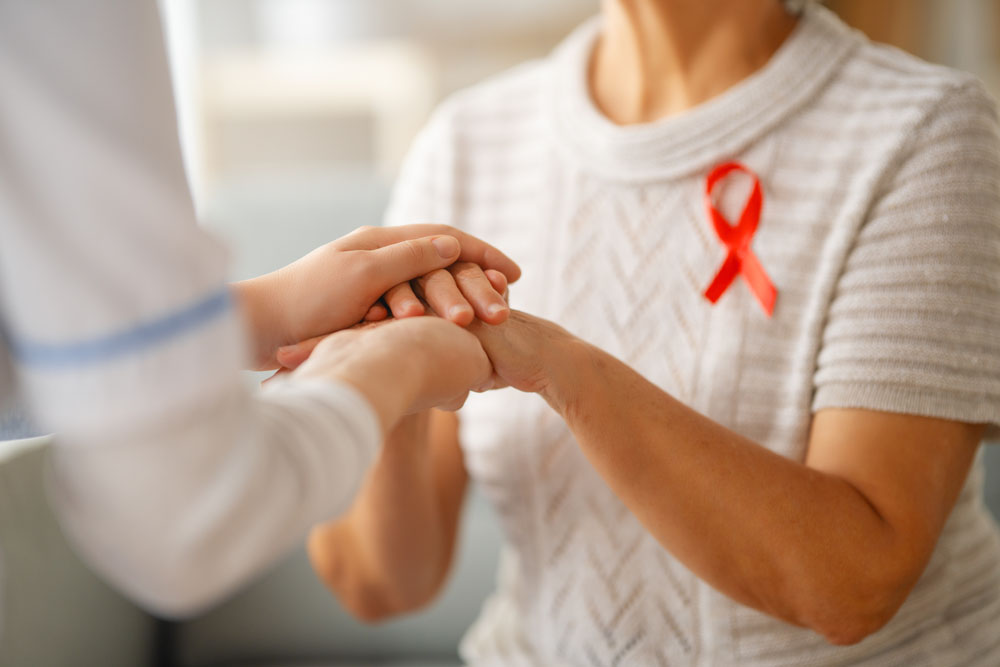No products in the cart.

Beyond the Diagnosis: Empowering Ways to Support Individuals Living with HIV/AIDS
Living with HIV/AIDS can be an incredibly challenging experience, the physical, emotional, and social impact of the disease can be significant, leaving individuals feeling overwhelmed and alone.
Leprosy is a contagious and debilitating disease that drew social stigma in bible depictions, but that did not stop Jesus from associating with lepers and tending to them.
“When Jesus came down from the mountain, great crowds followed Him. And then a leper approached, did Him homage, and said, “Lord, if You wish, You can make me clean.” He stretched out His hand, touched him, and said, “I will do it. Be made clean.” His leprosy was cleansed immediately.”
Matthew 8-2:2-3
Just as Jesus cared for and loved people suffering from leprosy, we as a community are called to offer love and acceptance to those living with HIV/AIDS. We can bring about change by creating an environment where people can openly talk about their condition, seek help, and receive the support they need to live fulfilling lives.
In this article, we will explore how HIV/AIDS affects a person, the health issues associated with the disease, the social stigma faced by people living with HIV/AIDS, and the different ways that you can support someone living with HIV/AIDS. We hope to provide you with the information and resources you need to help those affected by this chronic illness feel supported, loved, and valued.

Health and Social Stigma-Related Impacts of HIV/AIDS
HIV (Human Immunodeficiency Virus) is a virus that attacks the immune system, making it harder for the body to fight off infections and illnesses. If left untreated, HIV can progress to AIDS (Acquired Immunodeficiency Syndrome), a condition where the immune system is severely compromised, making the person vulnerable to life-threatening illnesses.
It's heartbreaking to think about how HIV/AIDS can affect a person's health. The virus attacks the immune system, making it harder for the body to defend itself against infections and diseases. It's not just physical symptoms that can be debilitating. The emotional toll of living with this chronic illness can be immense. The fear and anxiety of what the future may hold can be overwhelming, leading to depression, isolation, and loneliness. It's important to remember that individuals living with HIV/AIDS are not defined by their illness, they deserve love, support, and compassion just like anyone else.
Health Issues Associated with HIV/AIDS
Living with HIV/AIDS can be a constant battle against various health issues that can take a toll on a person's physical and mental well-being. Here are some of the health issues that are associated with HIV/AIDS:
Opportunistic Infections
Acquiring HIV/AIDS means living with a weakened immune system, leaving individuals vulnerable to opportunistic infections that can range from minor to life-threatening illnesses. These infections can be physically and emotionally draining, making it difficult for those affected to carry out daily activities and maintain a sense of normalcy. The constant risk of infection can also cause anxiety and fear, making it challenging to maintain a positive outlook on life.
AIDS-Related Cancers
One of the devastating health issues associated with HIV/AIDS is the increased risk of developing AIDS-related cancers. These cancers, such as Kaposi's sarcoma, lymphoma, and cervical cancer, can be particularly aggressive and difficult to treat. It can be emotionally challenging for those with HIV/AIDS and their loved ones to cope with the diagnosis and treatment of these life-threatening conditions.
Neuropsychiatric Disorders
HIV/AIDS can also have a significant impact on a person's mental health, as the virus can affect the brain and nervous system, leading to neuropsychiatric disorders like dementia and depression. These conditions can cause significant distress and challenges for individuals, affecting their ability to live a fulfilling life. It's important to recognise and address the mental health needs of people with HIV/AIDS, as they can be just as important as their physical health needs.

Social Stigma Faced by People Living with HIV/AIDS
One of the biggest challenges faced by those with HIV/AIDS is social stigma and discrimination, which can lead to feelings of shame and isolation. They often face prejudice and mistreatment from others due to misconceptions and myths about the illness. This can make it hard for them to get support and treatment since they feel ashamed, afraid and isolated.
The social stigma surrounding HIV/AIDS can also have a significant impact on mental health, with many experiencing depression, anxiety, and low self-esteem. We must work towards creating a society that is compassionate and supportive of those living with the illness, where they are not judged or discriminated against for something that is beyond their control. Only then can we truly support those affected by HIV/AIDS and work towards eradicating the illness altogether.
Ways to Make a Positive Difference for People Living with HIV/AIDS

It can be a challenging and emotional experience to have a friend or loved one with HIV/AIDS. You may feel overwhelmed and unsure about how to provide the necessary support they need. Here are a few ways you can help:
Emotional Support For People Living with HIV/AIDS
1. Be a Good Listener
When someone you care about has HIV/AIDS, it’s crucial to be there for them in any way you can. Listening with an open heart and mind is a vital part of providing support. It can be challenging for someone with HIV/AIDS to navigate the complex emotions that come with the diagnosis, and having someone to listen to can make a world of difference. When you listen, you show them that their feelings and concerns matter and that they are not alone in their struggles. So, let them know that you are there to support them, no matter what.
2. Be Non-Judgemental
It’s important to approach those with HIV/AIDS kindly and without judgement. It's not our place to make assumptions about their lives or choices. Our role is to be there for them, to provide them with support and care, and to let them know that they are not alone. Remember, everyone deserves to be treated with respect and compassion, regardless of their circumstances. So be non-judgmental, and offer your love and support without hesitation.
Financial Support to People Living with HIV / AIDS
The financial burden of the disease only adds to the already heavy load that those affected must carry. Seeing a loved one struggling to make ends meet and pay for medical care can be heartbreaking, but offering financial support can make a significant impact on their well-being and quality of life. It's a tangible way to demonstrate your love and care and help alleviate some of the financial strain that comes with living with HIV/AIDS.
Providing financial support, such as helping with medical bills, food, and housing, can make a tremendous difference and bring much-needed relief. When you offer financial support to someone living with HIV/AIDS, you're not just helping with the immediate costs of treatment and care. You're also providing peace of mind and reducing the stress and anxiety that come with financial hardship. Your support can mean the difference between someone being able to access the care they need and being forced to go without.
The impact of HIV/AIDS on individuals and their families is profound and far-reaching. It can take a toll on one's physical and emotional well-being, as well as their finances. We must come together to challenge the stereotypes and stigma surrounding HIV/AIDS and offer compassion, understanding, and support. Every gesture, no matter how small, can make a world of difference in someone's life. Let's work together to create a world where everyone living with HIV/AIDS is treated with the dignity, respect, and care they deserve.
Support People Living with HIV/AIDS with CARE
Catholic AIDS Response Effort or also known as CARE is a beacon of hope for those living with HIV/AIDS. Their primary programme is running a shelter for homeless men living with the disease and providing a haven where we can find temporary lodging, clothing, and food. But CARE doesn't stop there. They go above and beyond by adopting a holistic approach to help these men return to society and lead fulfilling lives.
Their non-residential programme provides financial assistance and other forms of support for HIV+ women and their families, ensuring they have access to essentials like monthly food rations, school transport money for school-going children, and school textbook allowances. This support can make a significant difference in their lives, reducing their financial burden and bringing much-needed relief.
CARE also conducts regular outreach programmes at Catholic schools and parishes, raising awareness about HIV/AIDS and combating social stigma. By supporting CARE, you can help them continue their crucial work and make a positive impact on the lives of those living with HIV/AIDS. Consider donating to support their programmes and make a difference today.
Ways to Give to The Caritas Singapore Family:
- Donation Page
- Donation Online
- Cash or Cheque Donation
- Start a Fundraiser
- Donate through GIRO
- Legacy Giving
Thank you for your kindness and compassion towards people living with HIV/AIDS in Singapore.
